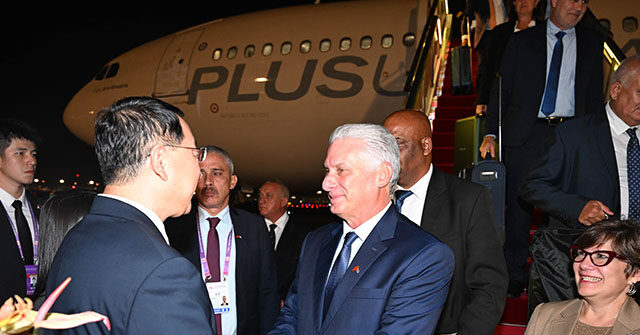Cuba Foreign Trade and Investment Minister Oscar Pérez-Oliva claimed this week that the Castro regime negotiated a “restructuring” of its undisclosed financial debt to China, Cuban state outlets reported.
Pérez-Oliva traveled to China last week as part of figurehead “president” Miguel Díaz-Canel’s delegation on the occasion of the 80th anniversary of the end of World War II — a celebration in which the Chinese regime portrays Chinese communists as having played a key role in defeating Imperial Japan, diminishing the efforts of the government of the Republic of China, which would eventually settle in Taiwan.
Díaz-Canel met with genocidal Chinese dictator Xi Jinping after the event. Xi assured the Cuban “president” that China will continue supporting Cuba. According to the Cuban presidency, both regimes signed 11 agreements related to China’s predatory Belt and Road debt trap program, political consultations, practical cooperation, cultural exchanges, and the “Global Security Initiative,” among other subjects.
Granma, the official newspaper of the Communist Party of Cuba, spoke with Pérez-Oliva during the Cuban delegation’s visit to Shenzhen. He praised the relations between both communist regimes and “the work of Chinese companies in supplying strategic products to key sectors of our economy and society.”
“In this case, we also had the opportunity to update them [China] on three fundamental issues. First, the processes we have been developing between the governments and institutions of the two countries for debt restructuring,” Pérez-Oliva said. “The government debt has already been restructured, the final details are being worked out to sign the restructuring of the bank and financial debt, and the conditions are also in place to gradually begin restructuring corporate debt.”
“This will put us in a better position to interact and enable Chinese entrepreneurs to play a more important role in the country’s development programs. We recognize that even in conditions of high debt levels, Chinese entrepreneurs continue to bet on Cuba and work with Cuba,” he added.
Over the past year, China has become the ailing Cuban regime’s main benefactor, replacing Russia, the Castro regime’s longtime benefactor during the Soviet era. The main reason for Cuba’s switch to China as main supporter, Reuters reported in June, was Russia’s “fizzled” promises to the ruling Cuban communists, which allowed the Chinese regime to “fill the void” left by Russia through the Belt and Road predatory program.
China’s reinvigorated “support” of Cuba in 2025 contrasts with reports published in 2024, which indicated the Chinese regime was “tired” of waiting for the Castro regime to enact changes in its ailing communist economy system, leading to “frozen” ties between the countries and canceled commercial agreements.
Although the Castro regime has not publicly disclosed the extent of its financial debts to China, the 2024 reports indicated that Havana owed “hundreds of millions of dollars” to Chinese companies such as Huawei and Yutong.
“Another point was the definition of strategic areas for bilateral cooperation, namely food production, both in agriculture and general food production, the energy sector, and information and communications technologies,” Pérez-Oliva said.
“We also reported on other areas of cooperation that have been identified and are moving forward, such as oil exploration and exploitation, mining, projects related to the recovery of the Cuban sugar agro-industry, and projects that can be sustainable and mutually beneficial in other sectors, such as tourism and trade,” he continued.
Pérez-Oliva said that the Cuban and Chinese officials addressed steps towards facilitating interbanking transactions between both countries — an issue that the Cuban Minister described as “very important” and one which “difficulties have arisen.”
“We explained that steps are being finalized to integrate Cuban commercial banks into the Cross-Border Interbank Payment System (CIPS), a system for conducting transactions that would put us in a better position to process our payments without the interference caused by the U.S. blockade,” Pérez-Oliva said. “We also reported on our authorities’ decision to increase the use of the renminbi in commercial transactions and payments in general between China and Cuba.”
“The use of CIPS and the renminbi [Chinese yuan] are two factors that offer security and different expectations for companies in both countries in relation to their commercial cooperation and investments,” he continued.
The Cuban minister, without disclosing further specifics, referred to the agreements signed between Xi and Díaz-Canel and said that the Belt and Road agreement is “unprecedented.” Another agreement, Pérez-Oliva explained to Granma, establishes the main cooperation areas between both countries.
“Both documents serve as guidelines for the work to be carried out, following this visit, to implement everything agreed upon between Xi Jinping and Miguel Díaz-Canel,” Pérez-Oliva said.
Christian K. Caruzo is a Venezuelan writer and documents life under socialism. You can follow him on Twitter here.
Read the full article here
